Africa food crisis: more than 150 million people are going hungry
Soaring food prices, conflict and climate change are plunging parts of Africa into a severe and enduring food crisis, with millions of people in Africa facing extreme hunger
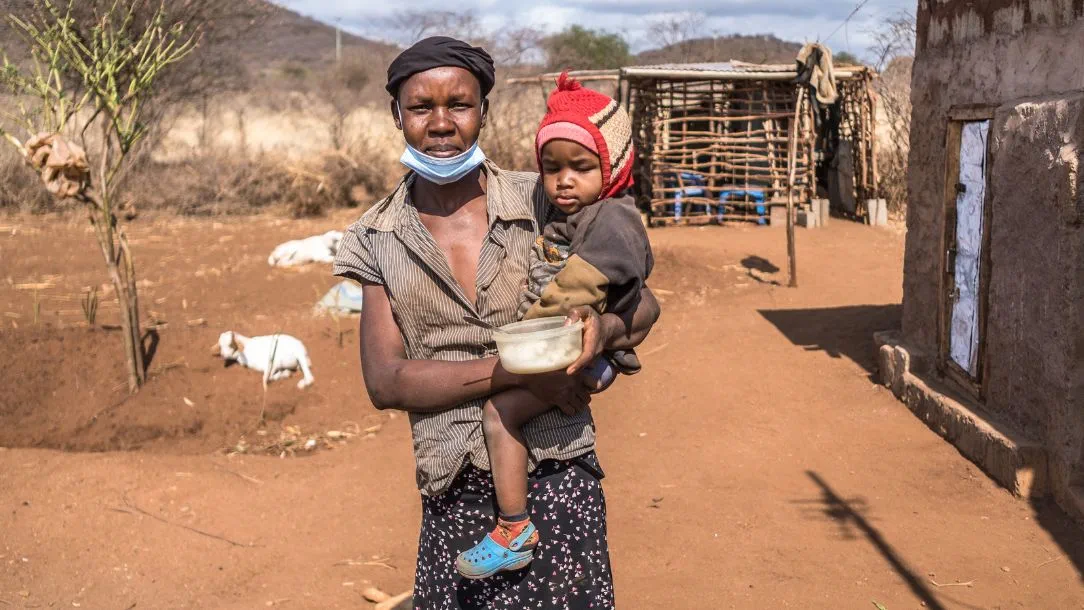
Agnes, with her son Jacob in Taita Taveta, Kenya. Her husband was injured and lost his job just before she gave birth. The Red Cross is working with mothers' groups to provide food and medicine for their children.
Last updated 7 December 2023
How extreme hunger is affecting people across parts of Africa: What are the causes of extreme hunger in Africa?
Communities across Africa including in Kenya, Nigeria, Ethiopia, and Somalia are facing the worst food crisis seen in 40 years. It's the worst crisis in decades - yet it's only just hitting the headlines.
Global factors such as ongoing climate change in Africa, the escalating conflict in Ukraine, inflation around the world, and a surge in global food prices have caused devastating ripples across the globe.
And now, due to the Indian Ocean Dipole and El Niño phenomena, heavy rains have hit the region hard since the end of October. They have triggered terrible floods with devastating consequences for both lives, livelihoods and food security, the short-term displacement of hundreds of thousands of people, and the heightened risk of water-borne disease and desert locusts.
Yet another climate shock is pushing some of the most resilient and resourceful people in the world to their breaking point.
Parents are being forced to skip meals so that their children can eat – sometimes not eating for days themselves. Children are being taken out of school to work to earn money, or to be sent to beg in nearby towns.
We’ve heard tragic stories of families being forced to leave their home to find food, and having to leave elderly loved ones behind because they are too weak to face the long journey on foot to an unknown destination.
No one should be forced into making decisions like these. We know there is a way forward. These are resilient communities, but after back-to-back emergencies their fortitude is fading.
According to the UN, 46 million people in Africa experienced hunger in the aftermath of the Covid-19 pandemic – that’s the highest share of any continent in the world.
Other factors, such as year on year droughts in the horn of Africa, locust storms destroying crops, internal conflict in Ethiopia, and floods and droughts across the Sahel were already having a devastating impact on people’s lives, families, health, and livelihoods.
Communities in Africa face a race against the clock
Over 150 million - the daily existence behind that number is bleak. But there is hope. In 2017, we pulled together to help avert catastrophe in the region, saving lives. Today, it's a race against the clock. We will not stop supporting communities and people in Africa, but we cannot do this alone.
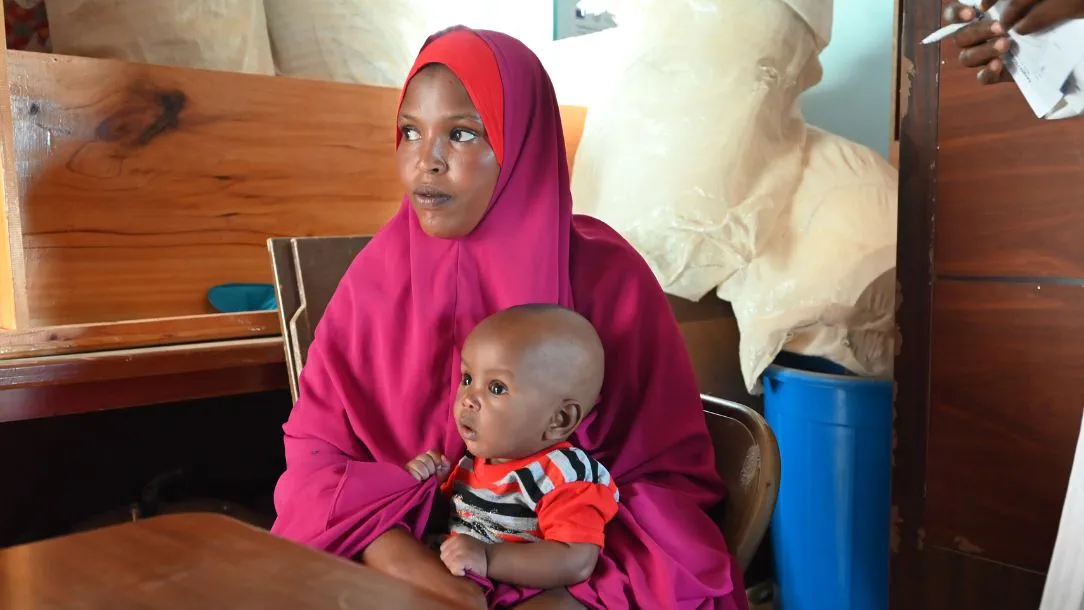
7 million people in Somalia are going hungry. Millions of children in Baidoa face malnutrition, and growing numbers are dying.
Extreme hunger in Africa: How the drought is affecting communities
The daily reality for people is heartbreaking. Parents are being forced to sacrifice meals so that their children can eat – sometimes not eating for days themselves.
Children are being taken out of school to earn money. But every morning families are still waking up to extreme hunger.
In Nigeria, an overwhelming 24.5 million people don’t have enough to eat. Across the continent, hunger is contributing to almost half of children's deaths.
We can help stop the situation from getting worse. But we need to act now.
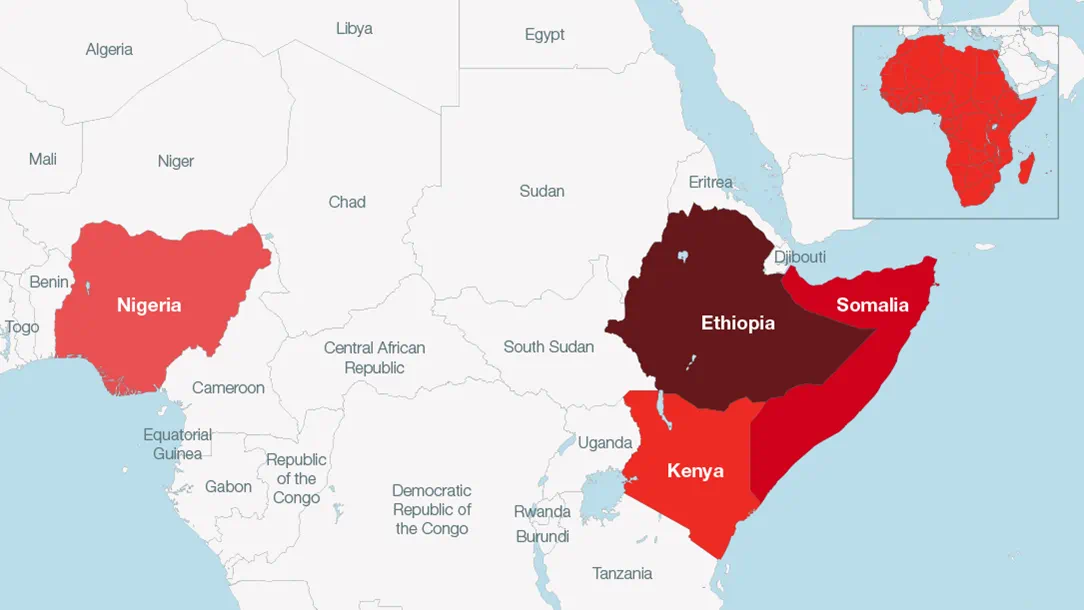
Map of Africa: communities in Nigeria, Ethiopia, Somalia and Kenya are facing a deep and enduring extreme hunger crisis.
A way forward: how the Red Cross is helping people in Africa facing extreme hunger
Red Cross teams are working on the ground across the continent, supporting people suffering from hunger, as they don't have enough of the food they need. We're also helping communities who have been hit hardest with water, food, immediate financial help, nutrition services, and healthcare.
We continue to help people adapt to the effects of climate change in Africa and build their long-term resilience to cope.
By providing tools, financial help, and vital skills and training, we can help make sure that families aren’t pushed to crisis point of extreme hunger.
Mike Adamson, chief executive of the British Red Cross, says that with a concerted and meaningful international and financial response, governments can help avert an otherwise certain catastrophe.
“The UK must play a leading role in responding to this growing emergency. Communities urgently need support, not only with immediate food and healthcare needs, but also longer-term, sustainable solutions.
By responding quickly and early in 2017, we prevented a calamitous crisis in the Horn of Africa. We must see that same urgency now.
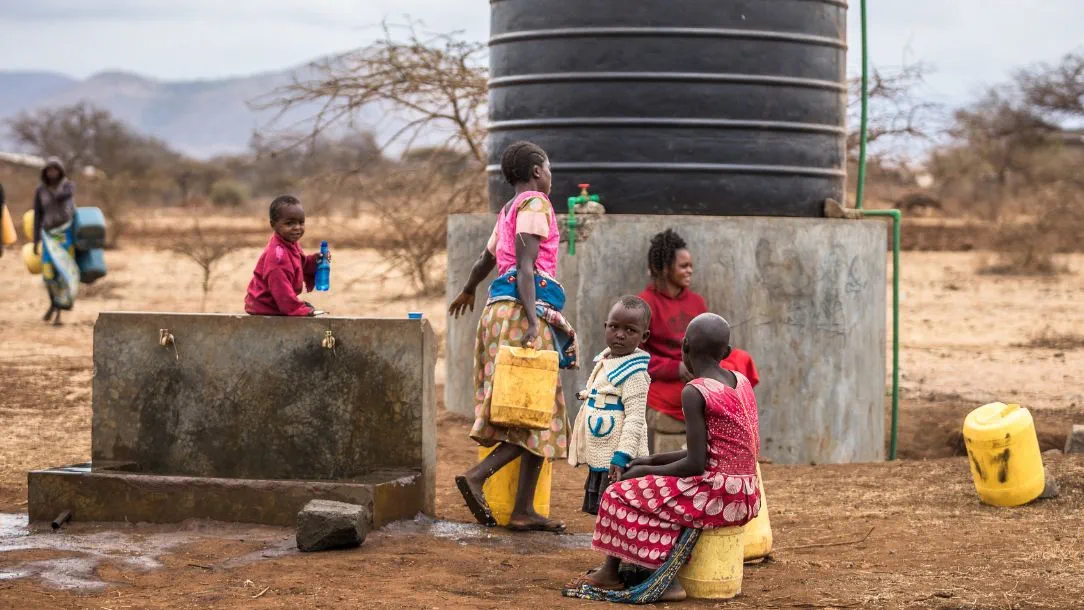
Carolyne visits one of the new tanks installed by the Red Cross to collect water for her family in Kenya, enduring ongoing drought in Africa.
In Somalia
The Somali Red Crescent has supported more than 500,000 people so far, including over 100,000 through clinics and mobile health clinics in the most affected areas.
At least 36,949 children have been reached through nutrition screening services and 78,245 people with medical treatment services.
Teams have also been supporting people most affected by extreme hunger in Somalia by providing financial support to buy food and essential items.
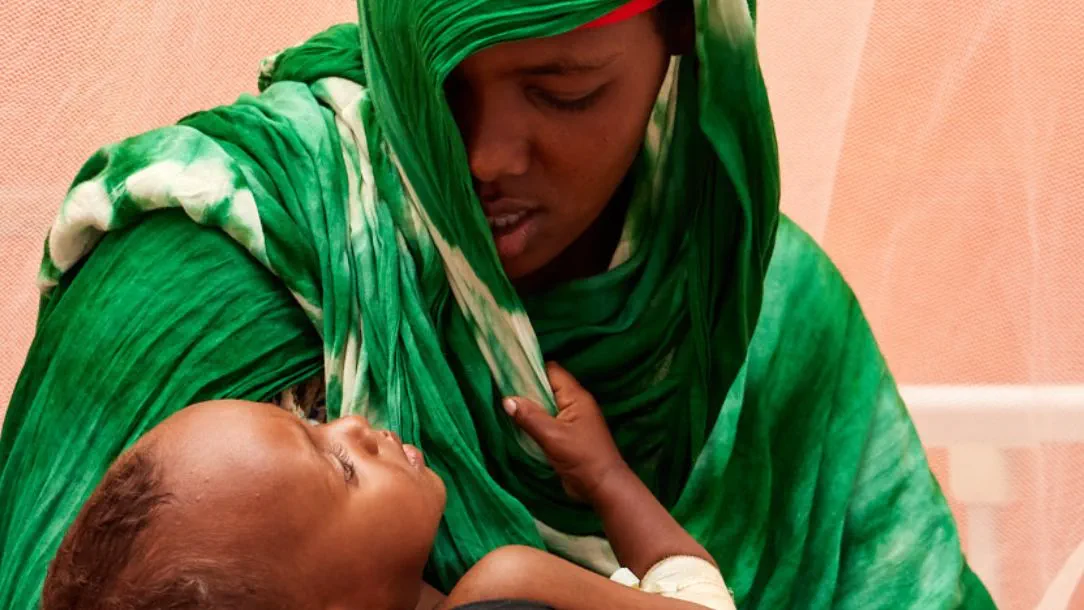
Leerto, 21, with her one-year-old son at the ICU wing of the stabilisation centre, where severely acute malnourished children are treated.
In Kenya
The Kenyan Red Cross has now reached more than 520,000 people as part of its drought response so far and is working to reach 500,000 more people experiencing extreme hunger in the worst affected communities in Africa.
Teams are also providing food, safe and clean drinking water to around 215,000 people, along with health support and livestock support, alongside financial assistance.
And the Kenya Red Cross society also supports Mother's Clubs - women's loans and savings groups.
The groups provide cash grants for starting small businesses, and opportunities for raising awareness on health, hygiene, nutrition and sexualand gender-based violence.
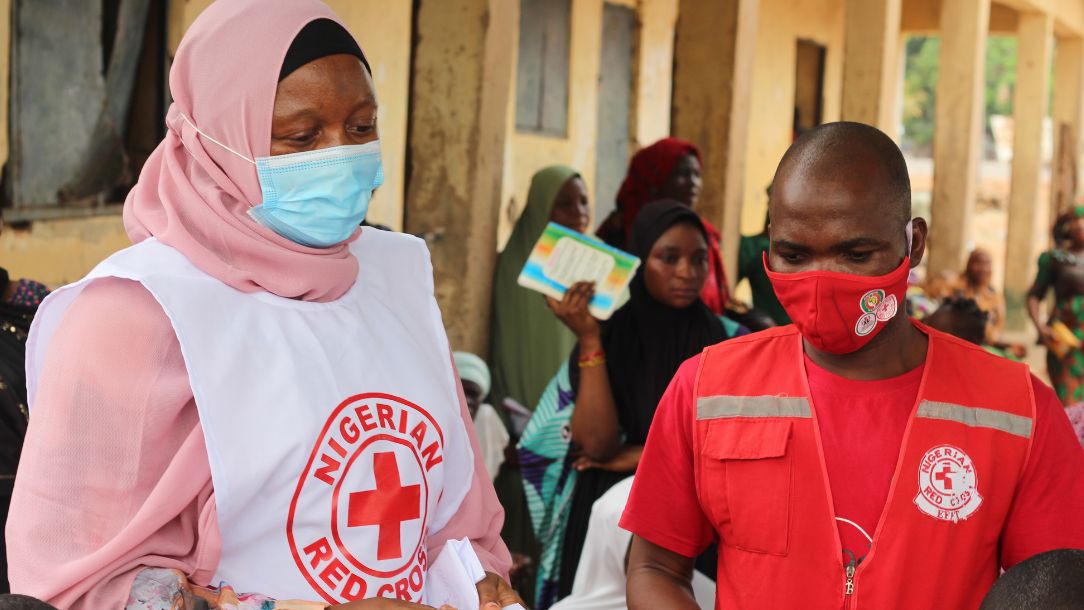
Nigerian Red Cross teams work with communities in Nassarawa State, helping people living with extreme hunger and drought in Africa.
In Nigeria
The Nigerian Red Cross is one of the lead responders in the country, supporting people affected by the extreme hunger crisis.
More than 98,000 people have been reached with health services, including malnutrition screening and referrals to health centres. Nutritional support to pregnant, and breastfeeding mothers is also being provided, to support healthy births.
In the North West and North Central states, people are being supported through food distribution, financial assistance, and support with essential household items, as well as seeds and tools for growing food.
Afrobeats star, Omah Lay, calls on world to wake up to the Africa Food Crisis.
In November, Omah Lay’s homeland was devastated by the worst floods the country has ever seen. The impact on Nigerian people already facing a grinding food crisis has been catastrophic.
The Afrobeats star urges the world to wake up and take action.
Donate to the Africa Food Crisis AppealIn Ethiopia
The Ethiopian Red Cross has been supporting people in Africa affected by the extreme hunger crisis, helping them to meet their basic needs.
They are providing financial assistance and food, farm tools, seeds and fertiliser to support people to maintain their livelihoods, alongside psychosocial support and protection services.
A total of 155,000 peoplehave been supported through cash assistance, 135,000 through health services and 194,000 with clean water and hygiene support.
In the Sahel
Communities across the Sahel are facing an emergency, with communities in Niger, Mali, Chad, Mauritania and Burkina struggling without the food they need. Many were already dealing with the most extreme crisis but, now drought, the Covid-19 pandemic and soaring food prices are only making the situation worse.
The British Red Cross is working at regional, national and local levels across the Sahel. We have set up the Sahel Livelihoods programme to build resilience across communities and to help them prepare for future crisis. Locally, we are helping people facing hunger with the Mothers' Club, groups of women who inform the community about health, hygiene and other issues.
More reading about the extreme hunger crisis in Africa
This is urgent. Please help us continue our work.
With your help, we can reach more people with the vital help they need.
Please donate to the Africa Food Crisis Appeal now